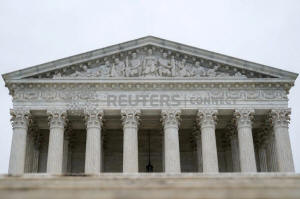U.S. Supreme Court leaves in place Kentucky abortion restriction
 Send a link to a friend
Send a link to a friend
 [December 10, 2019]
By Lawrence Hurley [December 10, 2019]
By Lawrence Hurley
WASHINGTON (Reuters) - The U.S. Supreme
Court on Monday left in place a Kentucky restriction requiring doctors
to show and describe ultrasound images to women seeking an abortion,
turning away a challenge arguing that the measure violates the free
speech rights of physicians.
The justices declined without comment to hear an appeal by the American
Civil Liberties Union (ACLU) of a lower court ruling that upheld the law
after a federal judge previously had struck it down as a violation of
the U.S. Constitution's First Amendment guarantee of free speech.
The Supreme Court has a 5-4 conservative majority and is closely divided
on abortion rights.
On March 4, the court is scheduled to hear its first major abortion case
in three years in a dispute over the legality of a Republican-backed
Louisiana law that imposes restrictions on doctors who do abortions.

The Supreme Court in 1973 recognized a woman's right to obtain an
abortion under the U.S. Constitution. In a 1992 ruling reaffirming that
right, the court endorsed so-called "informed consent" laws that require
women to be given certain information before they can obtain abortions.
"We are extremely disappointed that the Supreme Court will allow this
blatant violation of the First Amendment and fundamental medical ethics
to stand," said Alexa Kolbi-Molinas of the ACLU in reaction to the
Kentucky case.
Kentucky Governor Matt Bevin, a Republican who led the defense of the
law, applauded the decision, saying it "gives final affirmation to the
commonsense notion that patients should be well equipped with relevant
information before making important medical decisions."
The ACLU filed the lawsuit on behalf of EMW Women's Surgical Center,
Kentucky's only licensed abortion clinic, as well as doctors who work
there shortly after the law was passed in 2017.
Kentucky requires a physician or qualified technician to perform the
ultrasound and position the screen so the woman can view the images of
the fetus. The medical staff are required to describe what the images
show, including the size of the fetus and any organs or appendages
visible. They are also required to make audible the sound of the fetal
heartbeat.
The law requires the physicians to continue with the process even if the
patient objects and shows signs of distress. Doctors can be fined and
referred to the state's medical licensing board if they fail to comply
with the law.
[to top of second column]
|

The U.S. Supreme Court is seen in Washington, U.S., June 11, 2018.
REUTERS/Erin Schaff/File Photo

On the Louisiana law case next year, the high court's ruling could
lead to new curbs on access to abortion. Numerous Republican-backed
measures restricting abortion have been passed at the state level in
recent years.
The Louisiana case will test the willingness of the court, which
includes two conservative justices appointed by Republican President
Donald Trump, to uphold laws that lower courts have ruled
unconstitutional. The court has shifted to the right after Justice
Anthony Kennedy, a decisive vote in favor of abortion rights,
retired in 2018 and was replaced by Trump appointee Brett Kavanaugh,
who has a thin judicial record on the issue.
The Louisiana law requires that doctors who perform abortions have a
difficult-to-obtain arrangement called "admitting privileges" at a
hospital within 30 miles (48 km) of the abortion clinic. Challengers
say the regulation would lead to two of the state's three clinics
closing down.
In 2018, the Supreme Court blocked a California law requiring
clinics that counsel women against abortion to notify clients of the
availability of abortions paid for by the state, finding that it
violated the free speech rights of the facilities. In that 5-4
ruling along ideological grounds, the court's conservative justices
were in the majority.
A federal judge in 2017 struck down the law but in an April 2019
ruling the Cincinnati-based 6th U.S. Circuit Court of Appeals
declared it lawful.

In 2015, the Supreme Court rejected a bid by North Carolina to
revive a similar law that had been struck down. A similar law in
Texas was upheld by a federal appeals court in 2012.
(Reporting by Lawrence Hurley; editing by Grant McCool)
[© 2019 Thomson Reuters. All rights
reserved.]
Copyright 2019 Reuters. All rights reserved. This material may not be published,
broadcast, rewritten or redistributed.
Thompson Reuters is solely responsible for this content. |